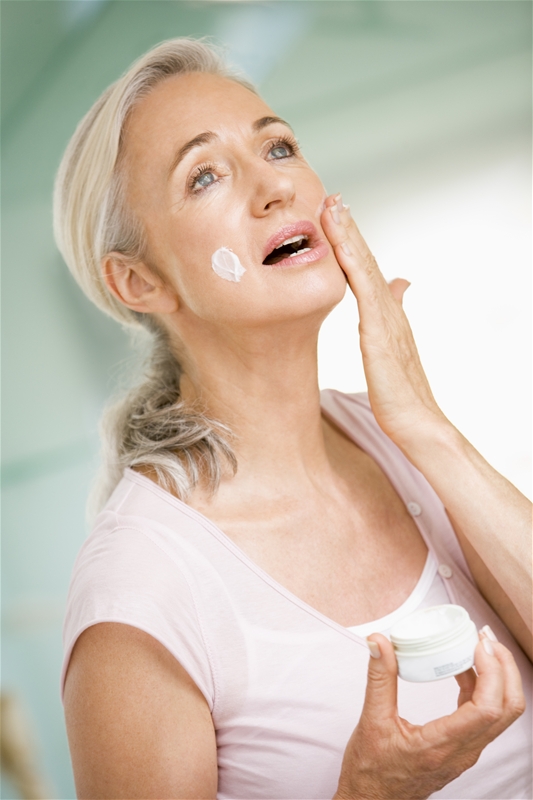
 Look up the word “sensitive” and you’ll find descriptors like, “easily hurt or damaged; delicate; touchy; calling for care or caution in treatment.” Every one of these descriptors applies to your skin if you’re going through chemotherapy. The drugs make your skin ultra sensitive, dry, flaky, tight, cracked, and in general, needing a lot of TLC from you. Products you used to apply to your once resilient skin now need to go away until treatment is over.
Look up the word “sensitive” and you’ll find descriptors like, “easily hurt or damaged; delicate; touchy; calling for care or caution in treatment.” Every one of these descriptors applies to your skin if you’re going through chemotherapy. The drugs make your skin ultra sensitive, dry, flaky, tight, cracked, and in general, needing a lot of TLC from you. Products you used to apply to your once resilient skin now need to go away until treatment is over.
This includes most (if not all) of the products that may now grace your medicine cabinet, bathtub, and shower. It’s time to put them in a bag and stash them out of sight, at least until you’re finished with treatment. Most contain ingredients that are way too harsh for sensitive skin. And we’re not just talking about skin-care products. Shampoos, body washes, lotions, shave creams, and perfumes can all add to the problem. If you want happier, more comfortable skin, scan your products for these ingredients, and restock your supplies with organic, chemical-free, and sensitive items.
Acids (retinol, salicylic, glycolic): This one may seem self-explanatory. After all, just the word “acid” is enough to make skin shrink away. However, because these ingredients have proven so effective at exfoliation and acne-control, they’re found in all kinds of products, including lotions, creams, body washes, gels, even foundations. Check every product you apply to your skin, and use alternatives for now.
Acne Products: Speaking of salicylic acid, put aside your acne products. They usually contain salicylic acid, retinol, benzoyl peroxide, and other harsh ingredients that further dry and irritate skin. Acne lotions are often drying, as they’re formulated to reduce skin oils. Right now, you need those oils! If you have acne during treatment, try more natural solutions like clay pastes-Nature’s Supplements suggests Bentonite, which naturally absorbs toxins. LoveLula.com offers several more suggestions, including Burt’s Bees Herbal Blemish Stick and an organic detox face mask.
High-Potency Vitamin C Products: Studies have shown vitamin C to be very effective against fine lines and wrinkles. However, vitamin C solutions are easily oxidized when exposed to air, and can encourage the formation of free radicals-something your sensitive skin definitely doesn’t need right now. In addition, high-potency vitamin C products are acidic and natural exfoliators. When you’re going through chemo, your skin is too fragile for this type of exfoliation. Wait until it recovers.
Synthetic Perfumes and Fragrances: If a product lists “fragrance” on its ingredient deck, avoid it. Most synthetic fragrances are actually mixtures of many (sometimes over 100) chemicals that can irritate and dry sensitive skin. Choose products that are lightly scented with essential oils and other natural ingredients to create lively scents.
Chemical Peels: Chemical peels use powerful acids to remove dead skin cells and stimulate collagen. No matter how you may feel about how your skin looks during treatment, do not make an appointment for a peel! Your skin is far too sensitive to withstand the assault-even of so-called “mild” peels-and you could end up with burns and permanent scarring.
Microdermabrasion: Though considered gentler than a peel, microdermabrasion still assaults the skin to exfoliate it, using air-blown, sand-type crystals. It can do wonders to liven up your complexion under normal circumstances, but remember-your skin is not “normal” during treatment. Treat it like a baby’s skin. You wouldn’t blast sand on a baby’s skin, right?
Alcohol, Menthol and Peppermint (or any product with a high content of essential oils): Products with any of these three ingredients can further irritate and dry your skin. Alcohol, because of its fast-evaporation rate, has a reputation for encouraging dryness, so stay away from rubbing alcohol, ethyl alcohol, and SD-alcohol 40. Menthol is found in a lot of shaving creams and is known to be harsh on sensitive skin. As for peppermint, it’s natural, but it’s also powerful. According to Dr. Baumann of Yahoo Health, peppermint can cause flushing and irritation when used on sensitive skin. As for essential oils, they too can be very irritating. Be sure to use organic products that are made for sensitive skin or choose fragrance–free products to avoid any irritation.
If you’ve got a favorite sensitive-skin product, please let us know about it!
Photo courtesy of Snap Village.

